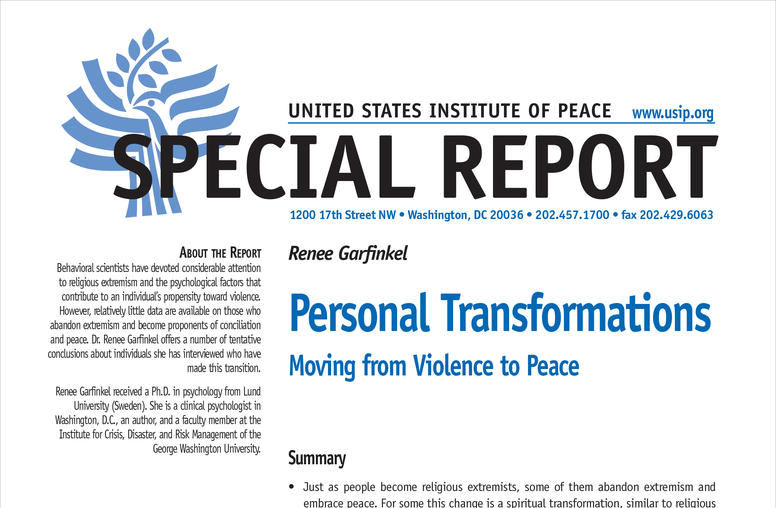Publications
Articles, publications, books, tools and multimedia features from the U.S. Institute of Peace provide the latest news, analysis, research findings, practitioner guides and reports, all related to the conflict zones and issues that are at the center of the Institute’s work to prevent and reduce violent conflict.
New Strategies for Darfur
While the humanitarian and security crises continue in Darfur, there have been some improvements in recent weeks, including the decrease in civilian casualties. However, in the first two months of 2007, 80,000 people were forced from their homes because of violence. How can the international community help enhance peacekeeping in Darfur?
Who Rules Ahmadinejad’s Iran?
Iran’s recent detention of 15 British sailors and marines has exacerbated tensions between the United States and Iran. With relations already strained due to Iran's activities in Iraq and its nuclear ambitions, understanding Iran's power structure and decision-making processes has become increasingly important.
Syria's Relations with Iraq
Stepped-up regional diplomacy initiatives on Iraq have brought new attention to the role of Iraq's neighbors. A March 10 conference in Baghdad brought together regional powers, including Syria and Iran, together with American and Western diplomats, and marked the most significant diplomatic gathering in Iraq since 1990. As the tempo of diplomacy gains momentum, there is renewed focus on Syrian-Iraqi ties and whether Syria can help bring stability to Iraq.
Security Sector Reform in Liberia: Domestic Considerations and the Way Forward
Security Sector Reform (SSR) is one of the four major objectives pursued by the Liberian government as it rebuilds after the fifteen-year civil war. What are the approaches and framework used by the government of Liberia to help rebuild this post-conflict state? How can the international community ensure that security reform continues to move forward?

Personal Transformations: Moving from Violence to Peace
Behavioral scientists have devoted considerable attention to religious extremism and the psychological factors that contribute to an individual’s propensity toward violence. However, relatively little data are available on those who abandon extremism and become proponents of conciliation and peace. Dr. Renee Garfinkel offers a number of tentative conclusions about individuals she has interviewed who have made this transition.
Reforming the Iraqi Interior Ministry, Police and Facilities Protection Service
Robert Perito testified before the House Armed Services Subcommittee on Oversight & Investigations on the progress and challenges toward transitioning security responsibilities to the government of Iraq.
U.S.-Pakistan Strategic Relationship
Briefing before the bipartisan Congressional briefing series sponsored by Congressmen Howard Berman (D-CA) and Chris Shays (R-CT) on how to generate greater action by the government of Pakistan against extremist elements operating within its borders with Christine Fair and the International Crisis Group.
The Marmara Declaration
Against the backdrop of intensified regional diplomacy, a high-level group of foreign policy and national security figures from Iraq and its six neighbors (Iran, Jordan, Kuwait, Saudi Arabia, Syria and Turkey) engaged in a wide-ranging, constructive, non-official dialogue on ways to stabilize Iraq and improve regional security.
Extrajudicial Killings in the Philippines: Strategies to End the Violence
Gene Martin testified before the Senate Foreign Relations Subcommittee on East Asian and Pacific Affairs on "Extrajudicial Killings in the Philippines: Strategies to End the Violence."
Trauma and Conflict Web Links
Below are links by topical categories to resources primarily in English providing information on trauma in zones of conflict and specifically, training for trauma relief. For regional information, please see related links at Regional Resources. General Resources Training Programs, Projects and Publications These links complement the Institute Special Report: Training to Help Traumatized Populations. General Resources The sites below provide an overview and a variety of reso...